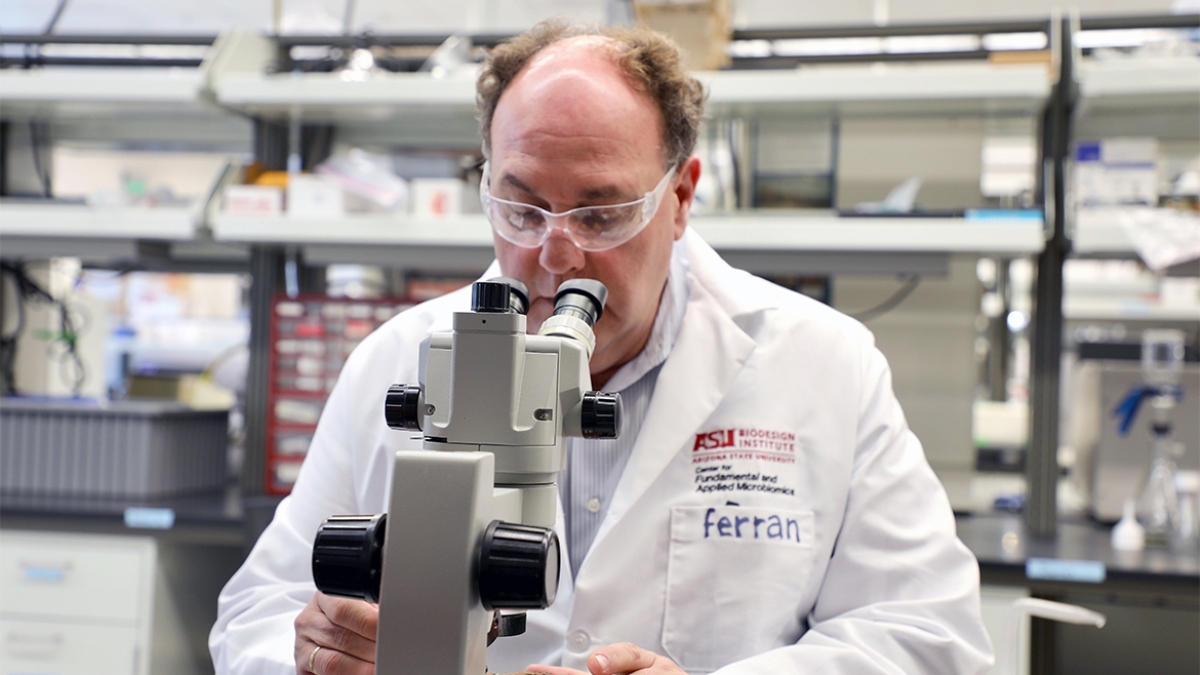ASU professor receives prestigious award for mentoring, interdisciplinary research

Garcia-Pichel is an internationally recognized geneticist, a microbiology professor for the ASU School of Life Sciences, and director of the Biodesign Center for Fundamental and Applied Microbiomics.
Ferran Garcia-Pichel, Arizona State University professor and researcher, has been awarded the 2021 D.C. White Award by the American Society for Microbiology.
The American Society for Microbiology is one of the largest professional societies dedicated to the life sciences and is composed of 30,000 scientists and health practitioners.
The award recognizes distinguished accomplishments in both interdisciplinary research and mentoring. It was created in honor of David C. White, a well-known microbial ecologist widely recognized as a leader in interdisciplinary science, and for his dedicated and inspiring work as a mentor and teacher.
Garcia-Pichel is an internationally recognized geneticist, a microbiology professor for the ASU School of Life Sciences and director of the Biodesign Center for Fundamental and Applied Microbiomics.
ASU’s Biodesign Institute is the nation’s first interdisciplinary research institute dedicated to solving complex global challenges by reimagining the “design rules” found in nature to create bio-inspired solutions.
The Center for Fundamental and Applied Microbiomics aims to develop a thorough understanding of the complex systems of microbes and what they have to teach us about their critical roles in other systems – human, animal, the environment and society. The center brings together researchers and scientists from a variety of disciplines, including engineering, medicine, biology, ecology, chemistry and public health.
Garcia-Pichel’s research focuses on the diverse adaptations and impacts of microbes in natural environments that range from desert soils to shallow marine waters.
“In my lab, we don't shy away from using different methods,” he said of his research on how and when Earth’s atmosphere became oxygenized. “We tend to follow the questions and use whatever discipline is necessary to find out the answers instead,”
By employing traditional biological methods, Garcia-Pichel and his team discovered that the progression of atmospheric oxygen on Earth can be traced through the evolution of genes in scytonemin molecules, commonly called the “sunscreen molecule” which helps some microbes in filtering harmful UV rays.
Garcia-Pichel received his Licenciatura con Grado in science (MS) at the Autonomous University of Barcelona, Spain, and his master's and doctorate from the University of Oregon in microbiology. He was a researcher at the Max Planck Institute for Marine Microbiology in Germany before accepting a position at ASU in 2002.
In addition to his extensive research contributions, Garcia-Pichel is heavily invested in improving undergraduate and graduate education. As well as teaching both entry-level and advanced microbial ecology and geomicrobiology courses, he has served in multiple leadership positions throughout his remarkable career — most notably, as associate director of research and training for ASU’s School of Life Sciences, and as dean of natural sciences in The College of Liberal Arts and Sciences.
“Professor Garcia-Pichel is a master teacher and a committed academic leader,” said ASU President Michael M. Crow, upon Garcia-Pichel's appointment as dean.
Garcia-Pichel is also one of the contributors to the School of Life Sciences' Ask a Biologist, an online learning resource for students, parents, and lifelong learners since 1997.
"I find it's a lot of fun to train people and to mentor people," he said in the charming bio, Meet Our Biologists. “I enjoy that and I enjoy seeing people grow into the field.”
More Science and technology

Cracking the code of online computer science clubs
Experts believe that involvement in college clubs and organizations increases student retention and helps learners build valuable…
Consortium for Science, Policy & Outcomes celebrates 25 years
For Arizona State University's Consortium for Science, Policy & Outcomes (CSPO), recognizing the past is just as important as…

Hacking satellites to fix our oceans and shoot for the stars
By Preesha KumarFrom memory foam mattresses to the camera and GPS navigation on our phones, technology that was developed for…